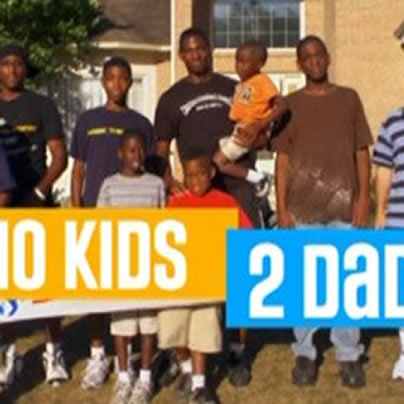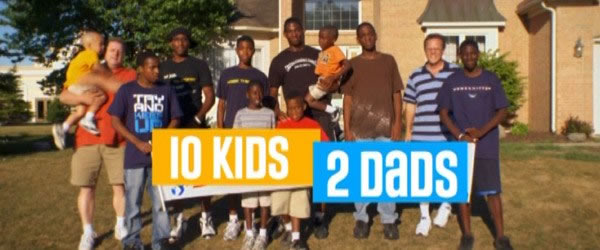Living
10 kids, 2 dads
Gay couple takes Father’s Day to a whole new level


Clint McCormack and Bryan Reamer are raising 10 kids in Michigan. (Photo courtesy the couple)
Trying to do a phone interview with Clint McCormack and Bryan Reamer, the two parents who were featured in OWN’s “10 Kids, 2 Dads” reality special last year, is a lot like trying to get honey out of a bee-lined hive. You’re not going to have an easy time of it. One kid comes in asking about food, another interrupts to talk about schoolwork, a third has just awoken from a nap and wants attention.
Still, somehow, the dads manage to live in this sort of controlled chaotic environment and create a loving family atmosphere where everyone is happy.
As a committed gay couple living in suburban Michigan, the couple knew they wanted to start a family, but 10 kids and nonstop commotion wasn’t exactly what they had envisioned.
What might seem crazy to most just felt right to the Farmington Hills couple, that originally set out to adopt just one child before eventually winding up with their 10 boys. McCormack comes from a family of six children while Reamer has just a brother, but both wanted to raise a family.
“We never intentionally wanted to adopt 10 children; it was the furthest thing from our minds,” McCormack says. “We thought maybe two or three max, but it just happened.”
After looking into foster children originally, McCormack found a place where they would be connected with birth mothers and in 1998, they adopted Keegan at his birth. Not satisfied to have an only child, a year later, they decided to look at adopting another child.
McCormack next found an agency in New Jersey to help the couple be matched with a child who could be a sibling to Keegan. Instead of one, the agency offered twins, Kenny and Mark (now 19).
“I decided to wait until I got the paperwork until I said anything to Bryan,” McCormack says. “Initially, he was a little wary of it, but we took the next step and met them and decided to proceed.”
No sooner was the twins’ adoption finalized when they got another call from the agency about a 3-year-old who they couldn’t find a home for. A caseworker came to their home, dropped off the kid and said, “I’ll see you on Sunday,” and then just left.
“He was not saying anything and I called Bryan and told him to hurry home. I noticed his diaper was wet and when I went to change it, I noticed he had leg braces on. I was never told that,” he says. “We brought him to a pediatrician the next day. He was really frail and going home, I was crying, saying I couldn’t adopt him because he’s going to die on us, and what would that do to our kids and I couldn’t handle it.”
Reamer knew that they couldn’t send him back. Being the more practical of the pair, he laid out his case that if they brought him back, he would die and the boy needed their love. Not long after, Caleb became son number four. Today, their “miracle kid” is walking normally and loving life.
“I thought our family was complete at that point,” McCormack says. “Maybe a year later, we got another call.”
The situation presented to them was that the agency had three brothers and they couldn’t find a home that would take in all three. They wanted Reamer and McCormack to consider adopting them, because if they didn’t, they would have to be split up.
“I called Bryan right away and told him they were going to split these kids up, and they were 7, 8 and 9, and you can’t do that to a kid. So, we started the whole process again,” McCormack says. “That’s how we got Seth (now 17), Garrett (now 18) and Graeme (now 19).”
With seven boys in the house, all becoming young men, McCormack started to yearn for the patter of little feet around the home again. He really wanted a baby — and a girl. The latter wouldn’t happen, but over the next few years Hayden (now 6), Liam (now 8) and Cooper (now 4) joined the family.
Before any of their adoptions went through, the couple asked themselves three questions:
“Can we do it financially? Can we do it physically? Can we do it emotionally?” Once an honest yes could be agreed upon, they knew it was in the cards.
“We are not adopting any more children,” McCormack says. “We have been offered two more children but we’ve turned them down. We are talking about what we want to do when we retire and stuff, and it’s like no more kids.”
The family lives in a four-bedroom house with two-and-a-half baths, and the oldest boys are currently in college and ready to move out. All the children have cell phones except the two little ones and they all constantly stay in touch with one another so everyone is always accounted for — at least as best you can with teenagers.
The two play to each other’s strengths to keep their home running smoothly. McCormack (or Papa as the kids call him) takes on the role of homemaker and chauffeur, while Reamer (Daddy) helps with homework and sports and is the disciplinarian of the household.
Reamer says his favorite thing about being a dad is when one of the younger kids comes up to him unsolicited and gives him a hug and kiss and says, “I love you Daddy.”
“Or when one of the older kids asks an interesting question. It gives me the opportunity to present different answers depending on situations,” he says. “This challenges them to broaden their scope of possibilities to evaluate when coming to a conclusion about something.”
Then he enjoys a lot of other dad-type things like sledding or attending sporting events.
“We always wanted children and when you want something, you make it work,” McCormack says. “We have really good kids. We were told things about their past where other people may have run away from, but we are very lucky.”
Think your life is consumed with kids’ activities? Imagine what McCormack and Reamer go through over the course of a week. There are sports, music lessons, school functions, community events, driving tests, play dates, doctor’s appointments and even college visits. And a lot of trips to the grocery store.
“I spend my days as a taxi driver,” McCormack says. “I try to remember everything but sometimes things fall through the cracks. Some have work, some have school, some have sports. I know where the kids are all the time, but I’m constantly being reminded I need to be here or there at a specific time.”
During the song “It’s a Hard Knock Life” from the musical “Annie,” there’s a lyric that goes, “Santa Clause we never see, Santa Claus what’s that, who’s he?” It’s something that hit very close to home for the two dads when they were first adopting their family.
“When we adopted our three together they didn’t know what birthdays were, they didn’t know what Christmas was, they didn’t know what Thanksgiving was, and they were 7, 8 and 9,” McCormack says. “They never experienced holidays. I was so dumbfounded that there are children in the states who don’t get anything for Christmas or experience Thanksgiving or Easter.”
Because of that, every Christmas the two dads and their 10 sons provide as many Christmas presents to foster children as they can through their foundation, Cee Bee Enterprises. Last year they provided gifts to more than 145 kids.
You would think that having 10 boys in the house would put a strain on the couple’s love life, but Reamer says that he and McCormack plan time together each day and still find time to do things away from the kids.
“We go out to dinner on Friday night and we have another home and our children are old enough where we can go up to our cottage for a weekend and the older ones can watch the littler ones,” he says. “We check on them constantly.”
As for the show on the Oprah Network, McCormack says it was a fun experience for everyone involved. Primarily shot in April 2012 in their former Canton home, the special chronicles the McCormack-Reamer family’s daily life, which includes all the madness you’d expect from a 12-person, two-dog household.
“Our reason for doing it was to show people that you can get great kids out of foster care,” he says. “We wanted people to see that it’s just like everyone else’s family.”
Real Estate
Celebrate the power of homeownership this Fourth of July
Owning a home is powerful act of self-determination

This Fourth of July, celebrate more than independence: celebrate the power of LGBTQ+ homeownership. Explore resources, rights, and representation with GayRealEstate.com, the trusted leader in LGBTQ+ real estate for over 30 years.
Home is more than a house: it’s a symbol of freedom
As the fireworks light up the sky this Fourth of July, LGBTQ+ individuals and families across the country are not just celebrating the nation’s independence — they’re celebrating personal milestones of freedom, visibility, and the right to call a place their own.
For many in the LGBTQ+ community, owning a home represents more than stability — it’s a powerful act of self-determination. After generations of discrimination and exclusion from housing opportunities, more LGBTQ+ people are stepping into homeownership with pride and purpose.
Why homeownership matters to the LGBTQ+ community
While progress has been made, LGBTQ+ homebuyers still face unique challenges, including:
- Housing discrimination, even in states with legal protections
- Limited access to LGBTQ+ friendly realtors and resources
- Concerns about safety and acceptance in new neighborhoods
- Lack of representation in the real estate industry
That’s why the Fourth of July is a perfect time to reflect not just on freedom as a concept, but on how that freedom is expressed in the real world — through ownership, safety, and pride in where and how we live.
Finding LGBTQ+ Friendly Neighborhoods
One of the top concerns for LGBTQ+ buyers is whether they’ll feel safe, accepted, and welcome in their new neighborhood. Thanks to evolving attitudes and stronger community support, many cities across the U.S. now offer inclusive, affirming environments.
Some of the best cities for LGBTQ+ home buyers include:
- Wilton Manors, Fla. – A vibrant LGBTQ+ hub with strong community ties
- Palm Springs, Calif. – A longtime favorite for LGBTQ+ homeowners
- Asheville, N.C. – Progressive and artsy, with growing LGBTQ+ visibility
- Portland, Ore. – Inclusive, eco-conscious, and diverse
- Philadelphia, PA – Rich in history and LGBTQ+ community leadership
When you work with an LGBTQ+ friendly realtor, you get insight into more than property values — you get a real perspective on where you’ll feel most at home.
Navigating the real estate process with confidence
Whether you’re a first-time gay homebuyer or preparing to sell your home as an LGBTQ+ couple, it’s essential to understand your rights and options. Here are a few key tips:
1. Work with a trusted LGBTQ+ real estate agent
Representation matters. A gay realtor, lesbian real estate agent, or LGBTQ+ friendly agent understands the unique concerns you may face and advocates for you every step of the way.
Use GayRealEstate.com to connect with LGBTQ+ real estate agents near you. For over 30 years, we’ve helped LGBTQ+ buyers and sellers find their ideal home and a professional who respects their identity.
2. Know your legal protections
While federal law (via the Fair Housing Act and Supreme Court rulings) prohibits housing discrimination based on sexual orientation or gender identity, enforcement can vary by state. Make sure to research:
- State-level housing discrimination laws
- Local LGBTQ+ protections and resources
- What to do if you experience discrimination during a transaction
3. Secure inclusive financing
While most lenders follow fair lending rules, it’s smart to seek out banks or credit unions with LGBTQ+ inclusive policies and a history of non-discriminatory lending practices.
4. Plan for the future as a family
For same-sex couples, especially unmarried partners, it’s vital to review how you’ll hold the title, designate beneficiaries, and plan your estate.
Ask your agent or attorney about:
- Joint tenancy with right of survivorship
- Living trusts
- Powers of attorney and healthcare proxies
Selling a home as an LGBTQ+ homeowner
If you’re listing your home, working with a gay-friendly real estate agent ensures your identity and story are honored — not hidden — in the process.
Highlight:
- Your community connections
- Your home’s role in creating a safe space
- Local LGBTQ+ resources to attract like-minded buyers
Showcasing the full value of your home includes sharing what it meant to live there authentically and safely.
Your home, your freedom
The Fourth of July reminds us that freedom isn’t just an abstract idea — it’s lived every day in the spaces where we find comfort, love, and belonging. For the LGBTQ+ community, the right to own and thrive in a home is part of the larger journey toward full equality.
At GayRealEstate.com, we believe every LGBTQ+ person deserves:
- A safe place to live
- A community that welcomes them
- An advocate in the home buying or selling process
Ready to make a move?
Whether you’re dreaming of your first home, upgrading with your partner, or selling a space that helped shape your identity, GayRealEstate.com is your trusted partner. With our nationwide network of gay realtors, lesbian real estate agents, and LGBTQ+ friendly professionals, we make your journey smooth, respectful, and informed.
Visit GayRealEstate.com to:
- Search LGBTQ+ friendly homes
- Connect with inclusive real estate agents
- Access free guides for buyers and sellers
- Protect your rights and get expert advice
This Fourth of July, celebrate more than independence — celebrate your freedom to live, love, and own with pride.

Did you melt like the Wicked Witch of the West this week?
As summer temperatures rise, keeping your home or apartment cool during a heat wave can become both a comfort issue and a financial challenge. One of the most effective ways to keep a home cool is to prevent heat from entering in the first place. Sunlight streaming through windows can significantly raise indoor temperatures. Consider the following solutions:
• Close blinds or curtains during the hottest parts of the day. Blackout curtains or thermal drapes can reduce heat gain by up to 30%.
• Install reflective window films to block UV rays and reduce solar heat without sacrificing natural light.
• Use outdoor shading solutions such as awnings (yes, the ones you removed because they were “dated”) and shutters to limit direct sunlight.
Fans are a cost-effective way to circulate air and create a wind-chill effect that makes rooms feel cooler.
• Ceiling fans should rotate counterclockwise in the summer to push cool air down.
• Box fans or oscillating fans can be placed near windows to pull in cooler evening air or push hot air out.
• Create a cross-breeze by opening windows on opposite sides of your home and positioning fans to direct airflow through the space.
• For an extra cooling effect, place a bowl of ice or a frozen water bottle in front of a fan to circulate chilled air.
To optimize natural ventilation, open windows early in the morning or late in the evening when outdoor temperatures drop. This allows cooler air to flow in and helps ventilate heat that built up during the day.
Appliances and electronics generate a surprising amount of heat. To reduce indoor temperatures:
• Avoid using the oven or stove during the day; opt for no-cook meals, microwave cooking, or grilling outside.
• Run heat-producing appliances like dishwashers and clothes dryers in the early morning or late evening.
• Unplug electronics when not in use, as even standby power can add heat to your space.
• Switching to energy-efficient LED lightbulbs can also reduce ambient heat compared to incandescent lighting.
If you do use an air conditioner, maximize its effectiveness by:
• Setting it to a reasonable temperature—around 76–78°F when you’re home and higher when you’re away.
• Cleaning or replacing filters regularly to maintain airflow and efficiency.
• Sealing gaps around doors and windows to prevent cool air from escaping. (Didn’t we all have a parent who said, “Close the door. You’re letting all the cool out?”)
• Using a programmable thermostat to optimize cooling schedules and reduce energy use.
If it is not cost-prohibitive, adding insulation in attics and walls can greatly reduce heat transfer. Solar panels that reflect heat can also help, as well as offset the cost of their installation. Adding weatherstripping around doors and windows, sealing cracks, and using door sweeps can make a significant difference in keeping heat out and cool air in.
Natural and eco-conscious methods can also help cool your home.
• Snake plants, ferns, or rubber trees can improve air quality and slightly cool the air through transpiration.
• White or reflective roof paint can reduce roof temperatures significantly.
• Cooling mats or bedding can make sleeping more comfortable without cranking up the A/C.
For renters or those who can’t make permanent modifications, there are still plenty of ways to keep cool.
• Use portable fans and A/C units instead of built-in systems, making sure they are the correct size for your space.
• Removable window film or static cling tinting can reflect heat without violating your lease.
• Install tension rod curtains or temporary blackout panels instead of hardware-mounted window coverings.
• Add draft blockers and weatherstripping tape that can be applied and removed without damage.
• Cover floors with light-colored rugs to reflect heat rather than absorb it.
• If allowed, use temporary adhesive hooks to hang reflective materials or light-filtering fabrics over windows.
Even if your space is warm, you can still take steps to help your body stay cool.
• Wear light, breathable fabrics like cotton or linen.
• Stay hydrated and avoid caffeine or alcohol during peak heat hours.
• Take cool showers or use damp cloths on your neck and wrists to bring your body temperature down.
Keeping your home or apartment cool in the summer doesn’t have to be expensive or energy-intensive. With a few adjustments such as blocking sunlight, optimizing airflow, using fans effectively, and making renter-friendly upgrades, you can create a more comfortable indoor environment while keeping energy bills in check.
Valerie M. Blake is a licensed Associate Broker in D.C., Maryland, and Virginia with RLAH @properties. Call or text her at 202-246-8602, email her at DCHomeQuest.com, or follow her on Facebook at TheRealst8ofAffairs.
Real Estate
The world’s on fire and D.C. is on sale (sort of)
Prices are up, but then again, nothing makes sense anymore

ICE is disappearing people, revered government agencies are shuttering, and who knows if we’ll be in World War III next week? But can you believe prices in D.C. are actually still up 6.3% since last year? It doesn’t make sense, and perhaps that does make sense, because nothing seems to make any sense any more.
That said, there are some parts of our market that are truly suffering. The interest rates, which have been up, up, up for about four years now, are the ongoing rain on our market’s military parade. Combine that with 75,000 federal employees taking a buyout nationwide, and DOGE cuts eliminating around 40,000 federal jobs in the District (per estimates by the D.C. CFO), not to mention thousands of other job losses in non-governmental organizations due to funding and program cuts, and you’ve got a case of uncertainty, and downright unaffordability in the pool of otherwise would-be buyers.
This has had a marked impact on properties that starter-home buyers and low- to mid-level employees would otherwise buy, most notably condominium and cooperative apartment units. These properties have already slowed in our market thanks to the profound impact that higher interest rates have had on their monthly carrying costs—pair that with job insecurity, and a lot of condos are proving to be very difficult to sell indeed.
So how is the average sale price up in our market?
The increase is almost entirely due to the resounding strength of the single-family home market, especially in upper Northwest D.C., where it is still quite common to see bidding wars, even on properties pushing past the $3M mark. It seems that buyers in that echelon are less impacted by a few percentage points in the interest rate, and less concerned about their job security. Notably, those buyers are often married with children and have an absolute need for more space, must stay in the area due to one spouse’s job, or the kid’s friend group, regardless of whether the cost of owning is thousands of dollars more per month than it would have been in 2020 or 2021. The continued appreciation in these neighborhoods defies imagination.
So, what to do if you are not one of those lucky enough to be shopping for a $3M home? The short answer: wait. If you want more space, rent your current place out and learn the joys of being a landlord while someone else pays your mortgage. Need the equity from your current home to buy your next place? Get a home equity line of credit, or loan, and pull the equity out of your current place to buy the next one. Or—and I have never recommended this before in 21 years of being a Realtor—rent for a few years. Sure, I’d love to list and sell your condo so you can climb the real estate ladder, but it might just be a waste of time, money or both if you could just ride out this storm and sell in a DOGE-less future.
All this said, there are some condos that seem to be immune from this recent negative news. Anecdotally, it feels like it’s the truly special ones that do just fine no matter the market. Our recent listing in Capitol Hill had a view from every one of its 15 windows of the Supreme Court. Sold in five days with six offers. Another condo was on the top two floors of a townhouse and had the coolest black wood floors that gleamed like a grand piano. Sold in four days at full price.
So, all is not for naught if you have a condo or home in an area that people want to be in, with nice space, light, amenities and a certain je ne sais quois. And, as long as we have a democracy in a few years, my experience says our market will be back, stronger than ever, really soon.
David Bediz is a Realtor and mortgage loan broker for the Bediz Group LLC and Home Starts Here, LLC. Reach him at [email protected].



















